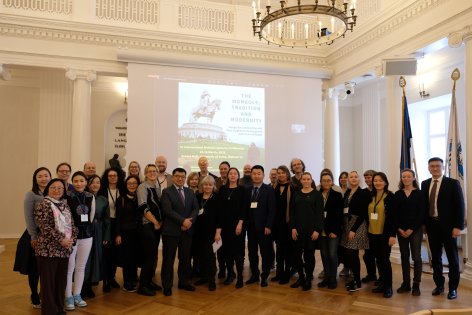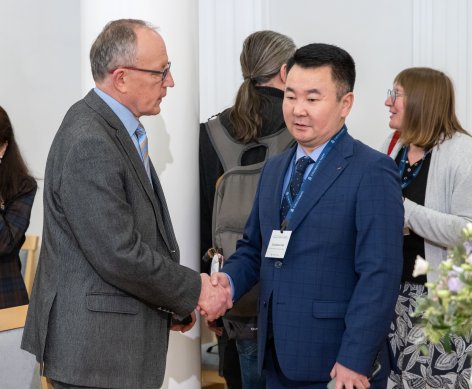-
Faculty of Arts and HumanitiesDean's Office, Faculty of Arts and HumanitiesJakobi 2, r 116-121 51005 Tartu linn, Tartu linn, Tartumaa EST0Institute of History and ArchaeologyJakobi 2 51005 Tartu linn, Tartu linn, Tartumaa EST0Institute of Estonian and General LinguisticsJakobi 2, IV korrus 51005 Tartu linn, Tartu linn, Tartumaa EST0Institute of Philosophy and SemioticsJakobi 2, III korrus, ruumid 302-337 51005 Tartu linn, Tartu linn, Tartumaa EST0Institute of Cultural ResearchÜlikooli 16 51003 Tartu linn, Tartu linn, Tartumaa EST0Institute of Foreign Languages and CulturesLossi 3 51003 Tartu linn, Tartu linn, Tartumaa EST0School of Theology and Religious StudiesÜlikooli 18 50090 Tartu linn, Tartu linn, Tartumaa EST0Viljandi Culture AcademyPosti 1 71004 Viljandi linn, Viljandimaa EST0Professors emeriti, Faculty of Arts and Humanities0Associate Professors emeriti, Faculty of Arts and Humanities0Faculty of Social SciencesDean's Office, Faculty of Social SciencesLossi 36 51003 Tartu linn, Tartu linn, Tartumaa EST0Institute of EducationJakobi 5 51005 Tartu linn, Tartu linn, Tartumaa EST0Johan Skytte Institute of Political StudiesLossi 36, ruum 301 51003 Tartu linn, Tartu linn, Tartumaa EST0School of Economics and Business AdministrationNarva mnt 18 51009 Tartu linn, Tartu linn, Tartumaa EST0Institute of PsychologyNäituse 2 50409 Tartu linn, Tartu linn, Tartumaa EST0School of LawNäituse 20 - 324 50409 Tartu linn, Tartu linn, Tartumaa EST0Institute of Social StudiesLossi 36 51003 Tartu linn, Tartu linn, Tartumaa EST0Narva CollegeRaekoja plats 2 20307 Narva linn, Ida-Virumaa EST0Pärnu CollegeRingi 35 80012 Pärnu linn, Pärnu linn, Pärnumaa EST0Professors emeriti, Faculty of Social Sciences0Associate Professors emeriti, Faculty of Social Sciences0Faculty of MedicineDean's Office, Faculty of MedicineRavila 19 50411 Tartu linn, Tartu linn, Tartumaa ESTInstitute of Biomedicine and Translational MedicineBiomeedikum, Ravila 19 50411 Tartu linn, Tartu linn, Tartumaa ESTInstitute of PharmacyNooruse 1 50411 Tartu linn, Tartu linn, Tartumaa ESTInstitute of DentistryL. Puusepa 1a 50406 Tartu linn, Tartu linn, Tartumaa ESTInstitute of Clinical MedicineL. Puusepa 8 50406 Tartu linn, Tartu linn, Tartumaa ESTInstitute of Family Medicine and Public HealthRavila 19 50411 Tartu linn, Tartu linn, Tartumaa ESTInstitute of Sport Sciences and PhysiotherapyUjula 4 51008 Tartu linn, Tartu linn, Tartumaa ESTProfessors emeriti, Faculty of Medicine0Associate Professors emeriti, Faculty of Medicine0Faculty of Science and TechnologyDean's Office, Faculty of Science and TechnologyVanemuise 46 - 208 51003 Tartu linn, Tartu linn, Tartumaa ESTInstitute of Computer ScienceNarva mnt 18 51009 Tartu linn, Tartu linn, Tartumaa ESTInstitute of GenomicsRiia 23b/2 51010 Tartu linn, Tartu linn, Tartumaa ESTEstonian Marine Institute0Institute of PhysicsInstitute of ChemistryRavila 14a 50411 Tartu linn, Tartu linn, Tartumaa EST0Institute of Mathematics and StatisticsNarva mnt 18 51009 Tartu linn, Tartu linn, Tartumaa EST0Institute of Molecular and Cell BiologyRiia 23, 23b - 134 51010 Tartu linn, Tartu linn, Tartumaa ESTTartu ObservatoryObservatooriumi 1 61602 Tõravere alevik, Nõo vald, Tartumaa EST0Institute of TechnologyNooruse 1 50411 Tartu linn, Tartu linn, Tartumaa ESTInstitute of Ecology and Earth SciencesJ. Liivi tn 2 50409 Tartu linn, Tartu linn, Tartumaa ESTProfessors emeriti, Faculty of Science and Technology0Associate Professors emeriti, Faculty of Science and Technology0Institute of BioengineeringArea of Academic SecretaryHuman Resources OfficeUppsala 6, Lossi 36 51003 Tartu linn, Tartu linn, Tartumaa EST0Area of Head of FinanceFinance Office0Area of Director of AdministrationInformation Technology Office0Administrative OfficeÜlikooli 17 (III korrus) 51005 Tartu linn, Tartu linn, Tartumaa EST0Estates Office0Marketing and Communication OfficeÜlikooli 18, ruumid 102, 104, 209, 210 50090 Tartu linn, Tartu linn, Tartumaa EST0Area of Vice Rector for Academic AffairsOffice of Academic AffairsUniversity of Tartu Youth AcademyUppsala 10 51003 Tartu linn, Tartu linn, Tartumaa EST0Student Union OfficeÜlikooli 18b 51005 Tartu linn, Tartu linn, Tartumaa EST0Centre for Learning and TeachingArea of Vice Rector for ResearchUniversity of Tartu LibraryW. Struve 1 50091 Tartu linn, Tartu linn, Tartumaa EST0Grant OfficeArea of Vice Rector for DevelopmentCentre for Entrepreneurship and InnovationNarva mnt 18 51009 Tartu linn, Tartu linn, Tartumaa EST0University of Tartu Natural History Museum and Botanical GardenVanemuise 46 51003 Tartu linn, Tartu linn, Tartumaa EST0International Cooperation and Protocol Office0University of Tartu MuseumLossi 25 51003 Tartu linn, Tartu linn, Tartumaa EST0Area of RectorRector's Strategy OfficeInternal Audit Office
Follow-up to the conference "Mongols - traditions and modernity"
On March 24-26, 2023, the Centre for Oriental Studies hold the 3d International Multidisciplinary Conference “THE MONGOLS - TRADITION AND MODERNITY: Mongolian communities and their neighbours facing global and local challenges”.
The conference was organised together with a constant partner of our Institute – the National University of Mongolia and Zayabaatar Dalai (Chairman of the National Council for Mongolian Studies, Government of Mongolia; Dean of the School of Arts and Sciences, National University of Mongolia; Director of the Institute for Mongolian Studies, National University of Mongolia).
This Conference was established in 2016 as a regular networking platform to facilitate exchange and cooperation among professional researchers, interested in various aspects of Mongolian, Inner, Central and East Asian Studies. This time the conference discussed topics relating to Mongolian peoples and their neighbours in various situations of challenges caused by natural, cultural, social, and political circumstances. It brought a broad approach to the discussion, based on diverse historical and contemporary perspectives on the geographical regions where Mongolian communities live and have lived (including Mongolia, China and Russia). The focus of the discussion was on local and global challenges and choices, and specific strategies used in dealing with various concerns.
The Conference became broadly international and brought together more than 100 participants, presenters, discussants and listeners, from 17 countries (Mongolia, Korea, Japan, United Kingdom, United States, France, Switzerland, Israel, Austria, Czech Republic, Hungary, Lithuania, Poland and others).
The conference consisted of 9 panels dedicated to various topics, including linguistics, archaeology, early and modern history, politics, social and economic issues, transnational relations, folklore, religions and arts. It also included a round table, which welcomed Mongolian and Central Asian Studies researchers from various countries to share and discuss their experiences of working in the time of the global pandemic, decolonisation debates and neoliberal academia.
The conference also included keynote lectures by the advanced scholars –
Prof. Dulam Sendenjav (Ulaanbaatar), Prof. Caroline Humphrey (Cambridge), Prof. Ágnes Birtalan (Budapest), Prof. Ludmila S. Dampilova (Ulan-Ude)
The conference became a fruitful avenue to start up new project ideas and plans for cooperation between a wide range of scholars and institutions. It also became a fortunate event to celebrate with our partners the recently established Mongolian Research Laboratory in the Institute of Cultural Research. The Laboratory received 150 books for its library – presents from the Ministry of Foreign Affairs of Mongolia, the Institute for Mongolian Studies at the National University of Mongolia and other universities and colleagues.
At the opening of the Conference Toomas Asser (Rector of the University of Tartu), Janabazar Tuvdendorj (Ambassador of Mongolia), Zayabaatar Dalai (National University of Mongolia), Liisi Karindi (Honourable Consul of Mongolia in Estonia), Ágnes Birtalan (President of the International Association for Mongol Studies; Head of the Department of Mongolian and Inner Asian Studies and Research Centre for Mongolian Studies, Eötvös Loránd University) gave their speeches to celebrate this event and to greet organisers and guests.
At the closing of the Conference, Mr. Sanjaasuren Bayaraa (Mongolian journalist, diplomat, former Ambassador of Mongolia to India and one of co-editors of the book "A.D. Simukov, Works about Mongolia and for Mongolia") shared a story of his family, connected to Estonia and Mongolia, experiences of repressions during the Soviet times and liberation and democratic revolutions in the 1990s.



An international master's in museums, heritage and education welcomes scholarship applications

University of Tartu and Estonian National Museum step up cooperation in teaching doctoral students

